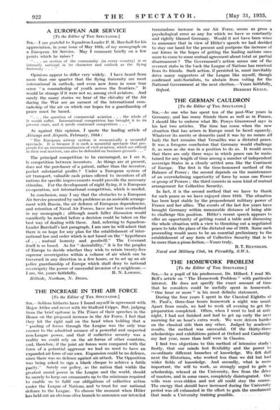A EUROPEAN AIR SERVICE
[To the Editor of THE SPECTATOR.] SIR,—I am grateful to Squadron-Leader P. R. Burchall for his
appreciation, in your issue of May 10th, of my monograph on a European Air Service. May I comment briefly on a few points which he raises ?
no section of the community (in every country) is so intensely national in its character and outlook as the flying fraternity . . . "
Opinions appear to differ very widely. I have heard from more than one quarter that the flying fraternity are most
international in outlook, and even now form in some true sense " a comradeship of youth across the frontiers." It would be strange if it were not so, among civil aviators. And surely the many stories we hear of the chivalry of the Air during the War are an earnest of the international com- radeship of the air on which our hopes for a guardianship of peace must be based.
" . . the question of commercial aviation . . . the whole of it would suffer. International competition has brought it to its present state, and it needs continued competition . . . "
As against this opinion, I quote the leading article of Airways and Airports, February, 1934 :
" The European airway system is economically a mournful spectacle. It is because it is such a mournful spectacle that pro- posals for an internationalization of civil aviation, which are ethical in their real motives, can also be defended on business grounds . "
The principal competition to be encouraged, as I see it, is competition between inventors. As things are at present, does not the purchaser of a patent, rather than the inventor, pocket substantial profits ? Under a European system of air transport, valuable cash prizes offered to inventors of all nations for specific improvements would provide the necessary stimulus. For the development of night flying, it is European co-operation, not international competition, which is needed.
In conclusion, may I say that the obstacles to a European Air Service presented by such problems as an amicable arrange- ment with Russia, the air defence of European dependencies, and retention of Naval Air Forces, have not been overlooked in my monograph ; although much fuller discussion would manifestly be needed before a decision could be taken on the best way of dealing with these. And, referring to Squadron- Leader Burchall's last paragraph, I am sure he will admit that there is no hope for any plan for the establishment of inter- national law and order which is not -based on the " hypotheses of . . . mutual honesty and goodwill." The Covenant
itself is so based. As for " desirability," it is for the peoples of Europe to decide whether they wish to retain twenty-five supreme sovereignties within a volume of air which can be
traversed in any direction in a few hours, or to set up an air police guardianship of Europe which shall deny to national sovereignty the power of successful invasion of a neighbour.—.
I am, Sir, yours faithfully, -R. N. LAWSON.
Hillside, .Northam, N. Devon.


























































 Previous page
Previous page